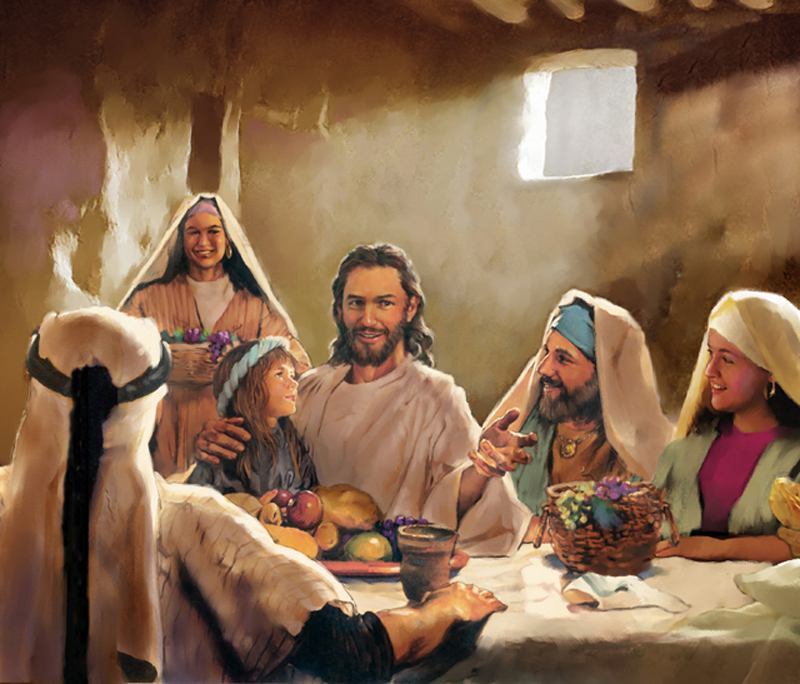If we’re not careful, we can de-personalize our God. We can’t think about God in terms of an idea or a force or a doctrine. You can’t love an idea or a force, you can’t be in relationship with a doctrine. So, we effectively remove the command to love God and replace it with acknowledge God. Or respect God. Consider God. Defend God. Study God.
Those verbs require very little, if any, personal relationship.
But our God is a personal and relational God. We know this because he revealed himself to us in his very personal and relational Son. Jesus Christ gave up everything to live with us, to live among us, and to live like us.
The Gospels all record our Lord Jesus going out of his way to be relational and personal with the people he met along the way. Just in the Travel Narrative, that ten-chapter section in the middle of Luke that gives us the details of Jesus’ last journey from Galilee to Jerusalem, Jesus interacts with people very personally. Intimately. Our Lord is powerfully present.
Luke 10 – Jesus is at Mary and Martha’s house getting ready for a meal. Picture our Lord inside their house, sitting down at their table eating their food, with them. Teaching them. Blessing them.
Luke 11 – Jesus teaches personally teaches his followers how to pray. And then he teaches them about hospitality by telling them a story about a meal. At the end of the chapter, Jesus is inside a Pharisee’s house, reclining at his table, eating his food, with him. And he teaches with a parable about dirty dishes.
Luke 13 – Jesus is in the synagogue on the Sabbath. Jesus is not a monk. He is at church every time the doors are opened, with God’s people, as was his custom. There’s a woman at church who’s been crippled for 18 years. When Jesus saw her, the text says, he called her near. He spoke to her. The Bible says he touched her. And he healed her. In the parable at the end of the chapter, Jesus paints a picture of the fulfillment of the Kingdom of God by saying it’s like a huge meal: “People will come from east and west and north and south and will take their places at the feast in the Kingdom of God!”
Luke 14 – Jesus is at another Pharisee’s house eating supper. If you pay attention, you’ll notice that our Lord is always eating a meal, just finishing a meal, or on his way to a meal. Jesus teaches and heals and blesses around the table. Around the bread and the fish, the fruit and the wine, the conversation and the hospitality. There are more stories about food in this chapter. The great banquet and all the invited guests. The open invitation. All things are ready! Everybody is invited to eat with the King!
Luke 15 – Jesus is accused of eating meals with sinners, of getting too close and personal with people who are unclean. So he tells these stories about seeking and saving the lost. Friends and neighbors rejoicing together over lost coins and sheep that have been found. The celebratory feast with the fattened calf and the loud music and dancing when the prodigal son comes home. Jesus says, “You are always with me, and everything I have is yours.”
Luke 16 – Jesus tells a story about a poor man who longed to eat what fell from the rich man’s table.
Luke 17 – Another story about sitting down and eating.
Luke 18 – Jesus pulls little children up into his lap. Sticky-fingered, snotty-nosed little kids. “Let the little children come to me and do not hinder them!” At the end of the chapter our Lord encounters a blind man at the Jericho city gates. Jesus brings the man near to him, the Gospel says. “What do you want me to do for you?” And he heals him.
Luke 19 – Jesus plucks a wee little man out of a Sycamore tree and says, “I must stay at your house today!”
The point is that Jesus went inside people’s houses. He went to people where they were. Around a table. In the kitchen. In the living room. Eating and sharing meals together.
Jesus never does anything halfway. When it comes to people, when it comes to the lost, our Savior goes all the way. He goes into people’s houses where it’s personal and close. He looks at their family pictures on the walls in the hallway. He reads the cartoons and the baby shower announcements held in place by flower magnets on the refrigerator. He sits down and shares meals. He passes the mashed potatoes. He compliments the cook. He laughs. He listens. And he shares.
Personal. Relational. Powerfully present.
Peace,
Allan

Leave a Reply